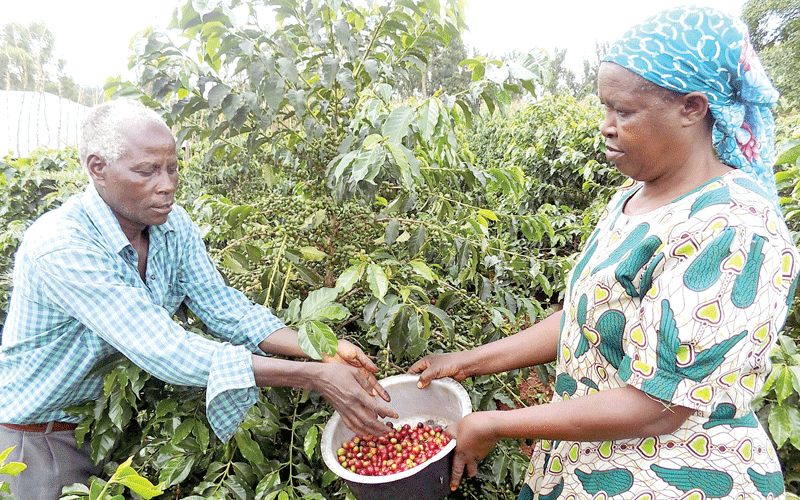Kenya’s coffee regains luster amid global price surge

After several years of suffering, the worst for coffee farmers in Kenya seems to be over as global prices hit a new high.
A kilo of Kenyan coffee in the global market is going for as high as 7 U.S. dollars, bringing back the glorious days for the country’s farmers.
Sometime in 2019, the global price of a kilo of Kenyan coffee hit 189 shillings (1.75 U.S. dollars), the lowest in over three years.
During the entire year, farmers did not sell their produce at more than 4 dollars a kilo in the global market, with the negative effects of the decline reverberating across regions that grow the crop in the East African nation.
Many farmers thus received paltry earnings, leading to despondency that saw some uproot the crop and replace it with others that they considered of high value, such as avocados and macadamia.
Joseph Mwangi, a farmer in central Kenyan county of Murang’a, is among those who uprooted their coffee trees.
“I had coffee on three acres but replaced the bushes on at least one acre with avocados, whose global market is stable,” Mwangi said.
Mwangi, as many other farmers, chose to keep some coffee bushes because of the sentimental attachment they have to the crop, which was grown by their forefathers.
The good times started in 2020, despite the COVID-19 pandemic disruption which hurt international trade, as the year turned out to be one of the best for coffee farmers after they received record earnings.
Kenya National Bureau of Statistics data showed the value of coffee exports rose 9.5 percent to stand at 202.2 million U.S. dollars in 2020, despite export volumes declined by 11 percent in 2020 to stand at 43,483 metric tonnes.
The positive effect was felt at the dozens of cooperative societies in the nation, through which farmers export their produce.
At Thiriku cooperative society in central Kenyan county of Nyeri, for instance, farmers received 1.12 dollars per kilo of coffee delivered in 2020, the highest in about a decade, the firm’s records show.
At Muguga society, also in Nyeri County, manager Gerald Mwangi said farmers earned an average of 0.93 dollars per kilogram.
And this is the case for other coffee societies in the region with the crop bringing cheers to many coffee growing households.
And 2021 seems to be no different as global coffee prices continue to surge.
In the first quarter of this year, Kenyan coffee price in the global market stood at between six U.S. dollars and seven U.S. dollars, according to KNBS, pointing to another good year despite the pandemic’s squeeze.
Besides the rising global prices, reforms instituted by the Kenyan government in the sector and sale of the produce directly to buyers abroad by the societies have also had a positive impact on farmers’ earnings.
A number of societies are currently exporting their produce directly to buyers in the United States, Netherlands and Denmark, instead of selling through the Nairobi Coffee Exchange.
The Kenyan government has instituted regulatory reforms in the sector, coming up with a new law that seeks to improve farmers’ earnings and enhance the crop’s contribution to the economy.
Further, the government has set up a three billion shillings (about 30 million U.S. dollars) revolving fund from which coffee farmers can borrow cash to cushion themselves from market volatility, pests, diseases and improve productivity.
Coffee is one of the major foreign exchange earners for Kenya, with the crop contributing about six percent of total export earnings and 0.3 percent of the country’s gross domestic product.














